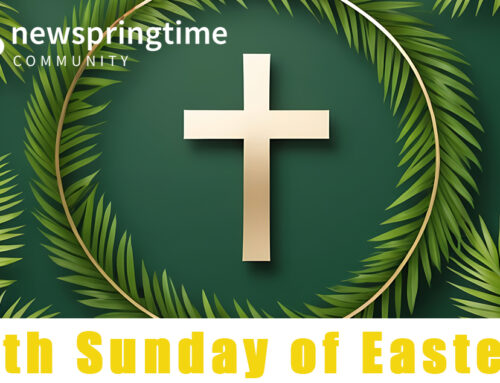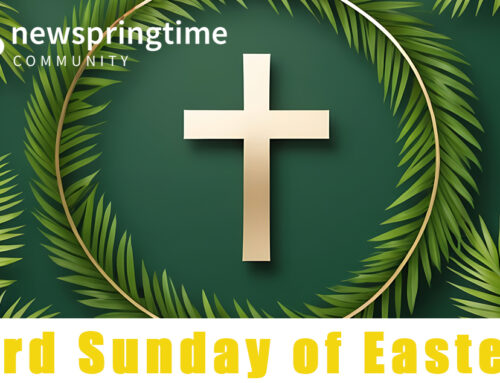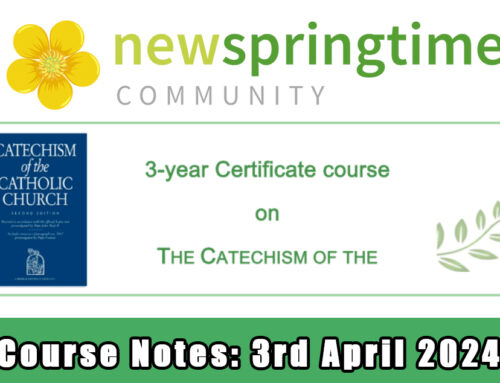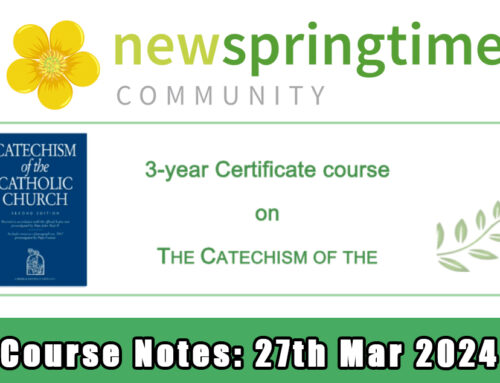The Catechism of the Catholic Church – Course Notes – Wednesday 25th October 2023
To download The Catechism of the Catholic Church course notes for 25th Oct 2023, please click here
Catechism Commentary Week 7
The foundation of faith is the conviction that God exists. All the other truths of faith depend on this one. In contrast to polytheists who believe in many Gods, Christians in common with Jews and Moslems, believe that there is only one God. In the bible, God reveals the divine nature by progressively disclosing the divine name/s, e.g., from I am who am, to Jesus. Unlike everything created, God is uncreated without origin and without end. St Augustine wrote, “We seek him in order to find him, and we seek him again after having found him. For finding him requires seeking him, because he is hidden; and after having found him, we must seek him again, for he is immense.” When God became man in Jesus, his humanity acted as our window on the truth of God. His words and actions were like so many panes of coloured glass in the window of his humanity. When illuminated by the light of the Spirit and viewed with the eyes of faith, we come to know something of the mystery of who the Father is, and what he is like. As Jesus testified, “he who sees me, sees the Father” (Jn 14:9). Is it any wonder that St Paul prayed in Eph 1:17, “I keep asking that the God of our Lord Jesus Christ, the glorious Father, may give you the Spirit of wisdom and revelation, so that you may know him better.” In knowing the Father we are in touch with the ultimate Truth, who can neither deceive nor be deceived, who is the source of all else that is true. The Bible asserts that God is love. That being so, the ultimate truth is Love. In revealing who he is and what he is like, God the Father reveals his incomprehensible love which is pure benevolence. God, more than any parent could do, wants what is best for all of us. That became evident in the life, death and resurrection of Jesus who gave his life in order that we might have our sin forgiven and be filled with the Spirit of his merciful love which is our pledge of the promise of eternal life with God.
The CCC then goes on to describe the implications of coming to comprehend the length and breadth, the height and depth of the love of Christ. It mentions three important responses
- Thanking and trusting always in him, even in adversity.
- Knowing the unity and true dignity of all human beings, created in his image.
- Making good use of the things which he has created.
The CCC then goes on to talk about God being a trinity, Father, Son, and Holy Spirit. “The mystery of the Holy Trinity is the central mystery of Christian faith and life. It is the mystery of God in himself. It is therefore the source of all the other mysteries of faith, the light that illumines them. It is the most fundamental and essential teaching in the hierarchy of the truths of faith” (# 234). Although there were intimations of the Trinity in creation and the OT, it was in the Incarnation that it was fully revealed. There are already intimations of the doctrine of the Trinity in the Old and New Testament.
Here is an Old Testament example. In Genesis 18 three men visited Abraham and his wife. These angels, i.e., messengers from God are understood to be an intimation of the three persons of the Trinity and are depicted in Rublev’s famous icon of 1360.
Here are three examples of mention of the Trinity in the New Testament, In Mt 3:16-17 we read, “As soon as Jesus was baptized, he went up out of the water. At that moment heaven was opened, and he saw the Spirit of God descending like a dove and lighting on him. And a voice from heaven said, “This is my Son, whom I love; with him I am well pleased.” In Mt 28:19 Jesus said in the great commission, “go and make disciples of all nations, baptizing them in the name of the Father and of the Son and of the Holy Spirit.” In 2 Corinthians 13:14 St Paul said, “The grace of the Lord Jesus Christ, and the love of God, and the fellowship of the Holy Spirit, be with you all.”
The Church’s belief in the trinitarian nature of the Godhead found expression in the Nicean Creed. We will return to the doctrine of the Trinity in later sessions when we study the creed.
Catechism Commentary week 8
The Church believes that there was a particular time when the created universe, visible and invisible came into being as God desired. As the book of Genesis says, “In the beginning….” The big bang theory and the law of entropy in cosmology seems to provide empirical support for this contention. Some scientists hypothesize that there were endless big bangs, and perhaps an endless sequence of universes that exist eternally in one way or another. Although there is no compelling evidence to support this contention, Christian thought would say that an eternally existing world would be contingent, i.e., not the adequate explanation of its own existence. Given that something cannot come from nothing, even an eternally existing universe would depend on God for its being. Creation did not depend on any pre-existing ingredients.
Christians believe that there is a hierarchy in the created realm. At the lowest level is inert matter, then there are living non rational forms of vegetable and animal life. Then we have human life which is rational and endowed by an immortal soul. Finally, there is the angelic realm of non-material pure spirits who are endowed with high intelligence and have several roles, e.g., worshipping God, bringing messages from God to human beings and guarding them from such things as the temptations, illusions and false inspirations of the fallen angels.
Speaking about the purpose of creation, it is well worth noting that the CCC mentions two main things, to praise God and to serve humanity. By fulfilling their God given purpose the non-human world praises God. As one Gaelic verse puts it, “only a fool would fail to praise God in his might when the tiny mindless birds praise him in their flight.” As for human beings, we serve an apprenticeship on earth by praising God for what we are destined to do in heaven in union with the angels. As Eph 1:12 says, God’s purpose was, “that we who were the first to hope in Christ [who first put our confidence in Him as our Lord and Saviour] would exist to the praise of His glory.” We are also here to serve humanity. There was a joke years ago where Charlie Brown said, “I love humanity, it is people I can’t stand.” We can serve one another by doing what Jesus said, “Do for others what you want them to do for you: this is the meaning of the Law of Moses and of the teachings of the prophets.”
The CCC goes on to say, firstly that in virtue of the creation of all things by God, although there are obvious differences, there is a common unity. This holistic view would be one factor underpinning ecology. Secondly, we are told that creation is governed by God given laws, e.g., the laws of physics, and there is also the moral law, e.g., the ten commandments, which govern human behaviour.
Finally, the question is asked, what is the connection between the work of creation, the original blessing, and the work of redemption? The saving work of Christ deals with the fallout of original sin, by bringing in the kingdom or reign of God by the outpouring of the gift of God’s merciful love. As John Paul II, said, through the action of the Holy Spirit, the Lord is seeking to create “a civilisation of love” which will only come to its fulfillment with the second coming of Christ when the devil will be cast down forever, death and sickness will be no more, and heaven will come to earth and transfigure it. When that occurs in the fulness of time, “everything will recover its true meaning and fulfillment.” As Dame Julian of Norwich put it, “All will be well, and all will be well, and all manner of things will be well.”
The Heavens declare the glory of God
In Rom 1:20 St Paul wrote, “For since the creation of the world God’s invisible qualities—his eternal power and divine nature—have been clearly seen, being understood from what has been made.”
- Consider this, it is estimated that the universe began with the big bang 13.8 billion years ago.
- Recent estimates tell us that there could be as many as two trillion galaxies in the observable Universe. A trillion is a million million, million.
- Astronomers estimate that the universe may contain up to one septillion stars. Our Milky Way alone contains more than 100 billion. That said, the universe is as crowded with stars as the Pacific Ocean would be if two grains of pollen were put, in a random way, floating on its surface.
- If we’re talking about the “visible universe,” then it would take around 47 billion years for light from anywhere to reach the edge. Light travels at 186,282 miles a second.
In Part 2, article 8 of his The Idea of a University, St John Henry Newman wrote, “There is but one thought greater than that of the universe, and that is the thought of its Maker.” In Ps 19:1-4 we read, “How clearly the sky reveals God’s glory! How plainly it shows what he has done!” In view of all this, surely, we have good cause to thank and praise God the Father who created all things through the Logos/Son by the power of his Spirit. As Jn 1:3., testifies about the Word, “Through him all things were made; without him nothing was made that has been made,” and astonishingly, he is the one who is present in such a humble way in the Eucharist we receive in holy communion.





